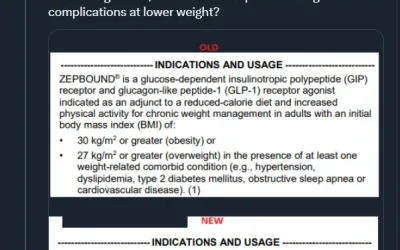Noom vs WeightWatchers: Which Weight Loss Program Is Right For You?
Noom and WeightWatchers are two of the most recognizable names in weight management, offering programs designed to support healthy eating habits and sustainable weight loss. Both have evolved significantly in recent years, expanding from app-based programs to more comprehensive care options.
“While app-based programs can provide helpful tools, obesity is a complex medical condition that often requires comprehensive clinical care,” explains Dr. Mike Albert, Chief Medical Officer and co-founder of Accomplish Health. “The key is understanding what level of support you need for sustainable results.”
Both programs share similarities in their core offerings, including flexible food-tracking systems and user-friendly virtual apps to track a client’s progress. However, they differ in their approach, structure, and available levels of support. This guide will help you understand how these programs compare and what kind of results you might expect from each.

What is Noom?
First launched in 2008, Noom began as a mobile health platform using psychology and coaching to help people develop sustainable healthy eating habits. Today, Noom has expanded its offerings to include both digital and medical care options.
Noom currently offers two distinct programs:
- Noom Weight: The original program, which offers daily lessons focused on behavioral modifications and food logging. It uses psychology-based coaching to help users understand their habits and make lasting changes.
- Noom Med: A comprehensive program that combines Noom’s behavioral approach with medical care, including access to healthcare providers and prescription medications when appropriate.
Both programs use Noom’s color-coded food system, categorizing foods as “green,” “yellow” or “orange” depending on their calorie density and nutritional value. This system encourages mindful eating without restricting food groups.
What’s Good About Noom?
No Foods are “Bad”
Many fad diets restrict specific foods or food groups. While this can lead to short-term weight loss, it’s often not sustainable long-term. Noom’s color-coded system helps people think about their choices while maintaining flexibility.
Psychology-Based Daily Lessons
Noom provides daily lessons that take 5-15 minutes, helping users understand their habits and the psychology around food. These lessons incorporate techniques from dialectical behavioral therapy (DBT), which can be particularly helpful for managing emotional eating.
Multiple Support Options
Noom offers various levels of support, from app-based tracking to comprehensive medical care. Users can choose the level of support that best fits their needs and goals.
What are the Drawbacks to Noom?
“While behavioral support is valuable, app-based programs often lack the medical oversight needed for treating obesity as a chronic condition,” notes Dr. Gregory Schroder, bariatric medicine specialist at Sentara Comprehensive Weight Loss Solutions. “Many patients require a more comprehensive approach combining medical supervision with lifestyle changes.”
Cost Considerations
While discounts and free trials are often available, Noom’s programs can be expensive. The base plan typically starts around $42 per month, with additional costs for medical care and one-on-one coaching.
Color Coding System Can Be Complex
While designed to simplify food choices, the color-coded system can sometimes be confusing. Foods may be categorized differently based on preparation methods, which can create uncertainty for users.
WeightWatchers (WW)
WeightWatchers, founded in 1963 and rebranded as WW in 2018, has continuously evolved its approach to weight management. The program uses a points-based system that allows flexibility while encouraging nutritious choices.
WeightWatchers has expanded to offer multiple program options:
- WeightWatchers Membership: The core digital program providing access to the app, nutrition plans, activity tracking, and virtual community support.
- Workshops: In-person and virtual group sessions led by health coaches for additional support and accountability.
- WeightWatchers Clinic: A comprehensive medical program offering one-on-one healthcare provider access and prescription medications when appropriate.
What’s Good About WeightWatchers?
Flexible Approach
No foods are off-limits in the WW program. The points system guides users toward nutritious choices while allowing for moderation and flexibility.
Customizable Plans
WW offers various meal plans accommodating different dietary needs, including vegetarian and gluten-free options. They also provide specialized guidance for people with diabetes.
Community Support
WeightWatchers offers both virtual and in-person community support options, which many people find helpful for accountability and motivation.
What Are the Drawbacks to WeightWatchers?
“The challenge with point-based systems is they can oversimplify the complex nature of obesity treatment,” explains Shelly Russell, Director of Medical Partnerships at Accomplish Health. “While tracking points can be helpful, sustainable weight management often requires more comprehensive medical support.”
Point System Complexity
Some users find the points system tedious to maintain long-term. Counting points for every meal and snack can become stressful and may impact their relationship with food.
Potential for Unhealthy Behaviors
The points system might lead some users to save or restrict points for certain foods, which could promote unhealthy eating patterns.
Cost Considerations
WW’s basic membership starts at $23 monthly, with additional costs for workshops and medical care through WeightWatchers Clinic.
How Accomplish Health Compares
While both Noom and WeightWatchers have expanded to include medical care options, Accomplish Health was built from the ground up as a physician-led weight management clinic. We provide comprehensive medical care that addresses weight management as a complex health condition requiring personalized treatment.
Our Medical Approach
We use an evidence-based weight management model delivered by board-certified physicians and registered dietitians. Our program includes:
- Monthly one-on-one visits with clinicians
- Personalized treatment plans
- Ongoing support and monitoring
- Integration of behavioral and medical approaches
Coaching and Support
Our program includes a dietitian-led health coaching initiative designed for long-term success. We combine Acceptance-Based Behavioral Treatment (ABT) with Standard Behavioral Treatment (SBT) strategies, providing tools for lasting behavioral change.
Insurance Coverage
Unlike many commercial weight loss programs, Accomplish Health accepts insurance, making our services more accessible. We understand that affordability is crucial, which is why we work with most insurance plans to create accessible treatment options.
Convenient Care
We offer 100% online telehealth services, providing high-quality, evidence-based care that fits into your life. You can track your progress using smart devices and share updates with your healthcare team.
Final Words
Choosing the right weight management program depends on your personal goals, lifestyle, and the type of support you need. While Noom and WeightWatchers offer various program options including medical care, Accomplish Health provides comprehensive, physician-led care specifically designed to treat obesity as a chronic condition.
Our highly personalized approach focuses on immediate goals and long-term health outcomes, supported by medical expertise and ongoing care coordination.
Ready to start your weight loss journey with medical expertise? Schedule a consultation with an Accomplish Health clinician today.
Disclaimer: This blog post is for informational purposes only and should not be considered medical advice. Please consult with a qualified healthcare professional before starting any weight management program.
References
- Chin SO, Keum C, Woo J, et al. Successful weight reduction and maintenance by using a smartphone application in those with overweight and obesity. Scientific Reports. 2016;6(1). doi:https://doi.org/10.1038/srep34563
- Glisenti K, Strodl E. Cognitive Behavior Therapy and Dialectical Behavior Therapy for Treating Obese Emotional Eaters. Clinical Case Studies. 2012;11(2):71-88. doi:https://doi.org/10.1177/1534650112441701
- Tate DF, Lutes LD, Bryant M et al. Efficacy of a Commercial Weight Management Program: A Randomized Multi-Country Controlled Trial. JAMA Network Open. doi:https://doi.org/10.1001/jamanetworkopen.2022.26561
- Thomas JG, Raynor HA, Bond DS, et al. Weight loss in Weight Watchers Online with and without an activity tracking device compared to control: A randomized trial. Obesity. 2017;25(6):1014-1021. doi:https://doi.org/10.1002/oby.21846
Stay in the loop.
"*" indicates required fields
Interested in becoming a patient?



